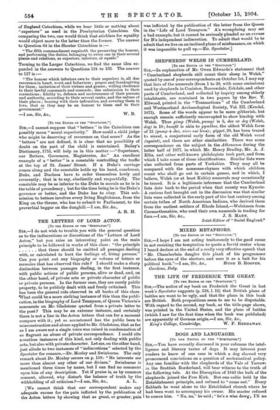[To THE EDITOR OF THE "SPECTATOR."]
SIR,—I cannot suppose that " betters " in the Catechism can possibly mean "moral superiority." How could a child judge who might be deserving of reverence on that score? As the " betters " are not defined, it is clear that no possibility of _doubt on the part of the child is entertained. Bailey's Dictionary, 1755, will help us in this matter :—" Superiours, our Betters, Governors, Magistrates, &c." An excellent example of a " better " is a constable controlling the traffic at the top of St. James' Street. If a Duke's carriage comes along and the constable holds up his hand, coachman, Duke, and Duchess have to order themselves lowly and reverently; that is to say, obediently and respectfully. The constable may be as inferior to the Duke in morals as he is in the table of precedency ; but for the time being he is the Duke's governor or better, and the Duke has to obey. This sub- mission to betters involves every living Englishman, from the King on the throne, who has to submit to Parliament, to the proverbial beggar on the dunghill.—I am, Sir, &c.,
A. R. H.










































 Previous page
Previous page